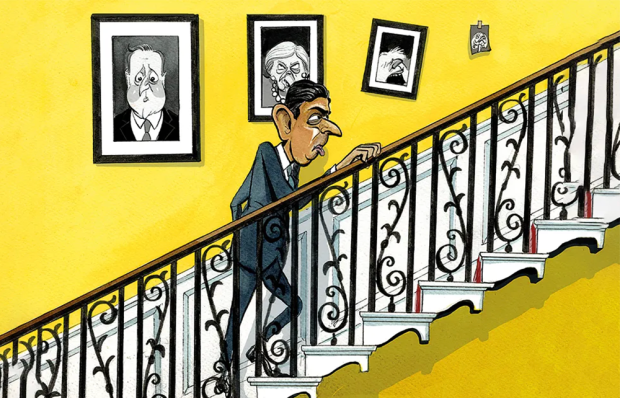Anyone would think (anyone, that is, who has followed our three main annual party conferences this autumn) that Britain’s principal political parties were proposing distinct solutions to Britain’s problems. After all, the heat if not the light emitted by domestic politics in recent years has been unremitting. Sir Keir Starmer spent more than half his conference speech in Liverpool attacking Rishi Sunak and the last 13 years of Conservative government. Mr Sunak, meanwhile, rose to a level of scorn quite untypical of this relatively polite man, when in his Manchester speech he laid into another relatively polite man, Sir Keir, and the Labour party he leads. These heightened levels of aggression (you might have thought) must betoken sharply contrasting proposed answers to some of the big questions our nation faces.
Let me suggest four. Abroad, I suppose the dominating puzzle is what to do about China. At home, three more. What to do about the National Health Service; how to fund social care for the growing numbers of the elderly; and how to inject productivity and growth into our economy.
These three domestic questions are linked, of course; but the difficulties with the NHS are not only about funding, and the problems with social care are not financial alone. Each presents a question of its own, as do relations with China.
So if our politics is faced with four big questions, and if in a democracy our political parties are there to compete for the best answers, what are the competing bids to each? ‘Must there be?’ you ask. No, I suppose it’s imaginable that there existed a good consensus on what to do, and parties bid simply to be chosen as best able to do it. Do we have such a consensus? We do not. In fact the opposite. Both our rival political parties are all stumped for a clear answer to any of the four questions posed above. None of them knows what to do.
It was not always thus. In 1979, the year I was elected to parliament, Margaret Thatcher led a Tory opposition whose policy offer diverged almost stingingly from the Labour prime minister James Callaghan’s. Callaghan’s (in his own words) was ‘steady as she goes’. Thatcher’s was to ‘galvanise’ (her words) a free market economy, reduce taxes massively over time, remove (her words) ‘the dead hand of socialism’ from the nation’s throat, and curb by legislation the power of the trade unions.
She believed such policies would reinvigorate the nation. Her proposals for doing this were much more step-by-step, more initially cautious, and more middle-term than the mythology that has now grown around her suggests, but the mythology is founded upon a great truth: that she and her party believed fiercely that they knew a way to fix things, while Labour believed stubbornly that it wouldn’t work. I imply no judgment here as to whether or not it did, but make the point only that, held out to the voters, were two acutely different proposed answers to the problems we faced.
Abroad, the Iron Lady was a great deal more alarmist (or, anyway, alarmed) about the Soviet threat than Labour. Often enough she had to be held back by colleagues and advisers from an even more belligerent approach than Britain was eventually to take. Labour, meanwhile, believed that a measure of wary engagement rather than strident opposition was the wiser course. Again, then, two sharply distinct proposed answers to a problem we faced.
How different from this autumn. Take (for instance) China. True, there are senior Con-servatives like Sir Iain Duncan Smith who have a radical answer to the question of what to do, but his is not HMG’s position, and nor is it Keir Starmer’s. My impression is that those in power here now, and those who might soon be, are perplexed about which way to jump. They watch China as one might watch a possibly brewing extreme weather event: with anxious attention but no clear remedy.
Or take the NHS. There’s been timid but significant language by Labour’s health spokesman, Wes Streeting, suggesting an un-ideological approach, but no proposals from either party for any reform that might match the scale of the difficulty that’s overtaking our health service. They don’t dare. Yet here is a failure of public administration that touches every life.
The same is true of social care. We simply must find a way of funding provision for the elderly and infirm that can keep up with the growth in their numbers. Theresa May did suggest one answer and it was given a prompt thumbs-down by the voters, after which I don’t know what the Tory plan is – do you? – and nor do we know Labour’s.
But perhaps most troubling among our big, chronic questions, is our feeble economic growth and almost stalled productivity. That many of our European competitors are in no happier a position should be no comfort. Our economic competitors in Asia, the Pacific and America look capable of powering ahead, yet ever-increasing numbers of us are going off sick, into semi-permanent invalid status or early retirement. Liz Truss did identify the problem but in truth none of our political leaders, Labour or Conservative, are in any doubt about it.
What, though, is the answer? Did you hear it from either the Tories or Labour? Both talked about investment in education, skills, science, technology, green industries and the like, but to me at least the language failed to match the sheer scale of the worry: the slow but seemingly inexorable attrition of our competitive edge, our ability to make our living in the world. Couple this with the obstinate reluctance of the British population to scale down their sense of entitlement to the health and welfare provision we see as our right, and I see a problem of democracy (as I’ve argued here before) of almost Argentinian proportions looming. Big questions; much noise; no answers. This has been a depressing conference season.
Got something to add? Join the discussion and comment below.
Get 10 issues for just $10
Subscribe to The Spectator Australia today for the next 10 magazine issues, plus full online access, for just $10.
You might disagree with half of it, but you’ll enjoy reading all of it. Try your first month for free, then just $2 a week for the remainder of your first year.















Comments
Don't miss out
Join the conversation with other Spectator Australia readers. Subscribe to leave a comment.
SUBSCRIBEAlready a subscriber? Log in